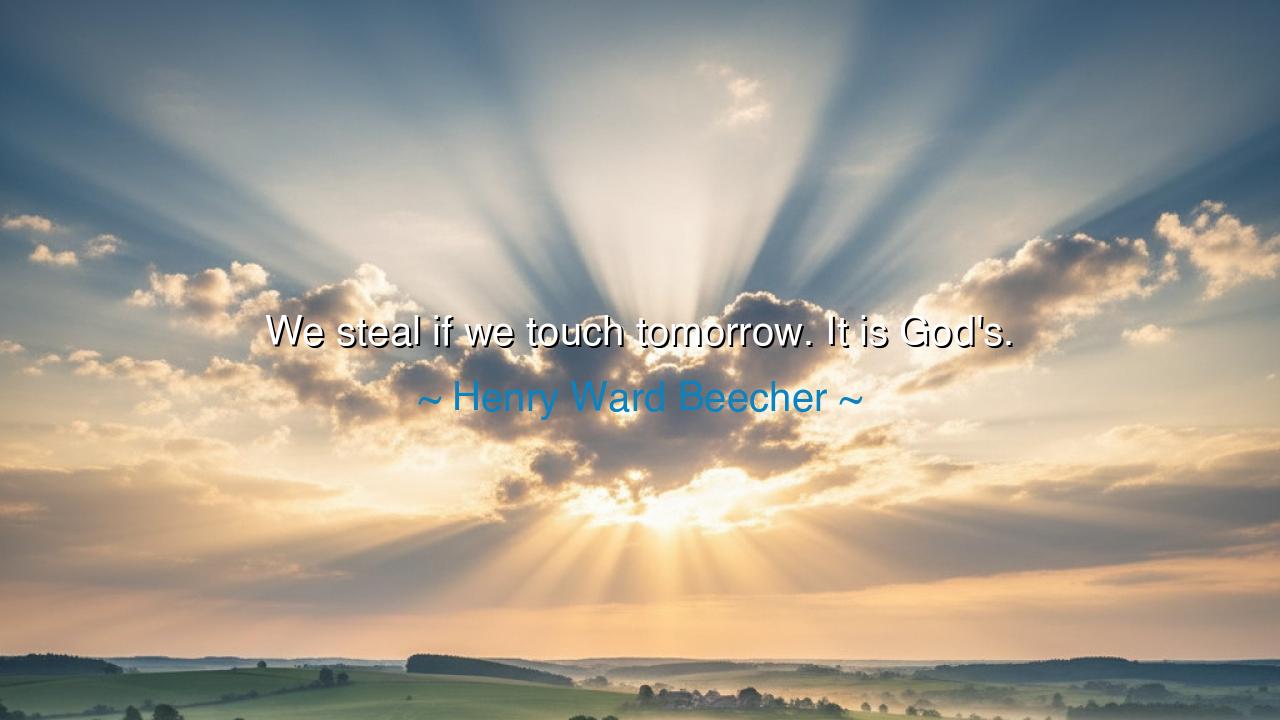
We steal if we touch tomorrow. It is God's.






"We steal if we touch tomorrow. It is God's." These profound words from Henry Ward Beecher speak to the very heart of humanity’s relationship with time, and they remind us of the sacredness of the present moment. To touch tomorrow—meaning to try and claim what lies ahead, to act as though the future is ours to control—is to overstep our bounds, to take what is not ours. The future, in Beecher’s view, is something beyond our grasp, something that belongs to the divine. We are stewards of the present, but the future is, by its nature, unknown and sacred, entrusted to God, or to fate, or to the natural flow of time. This powerful insight calls us to focus not on what is to come, but on what is here, right now.
In the ancient world, the concept of fate or divine will was central to human understanding. The Greeks, with their pantheon of gods, believed that the future was often in the hands of forces beyond human control. The Oracle of Delphi was revered as a gateway to divine knowledge of what would come, but even the wisest were told that the future could not be predicted with certainty—it could only be foreseen or guided by the gods. In this context, control over the future was not seen as a human prerogative, but as something that belonged to the divine order. Beecher’s words echo this ancient understanding that the future belongs not to us, but to a higher power—and to reach for it is to attempt a theft from what is sacred.
Similarly, in the Old Testament, the story of Job serves as a powerful example of the humbling nature of fate. Job, a man of wealth and virtue, was tested by God, losing his wealth, family, and health, and yet he never presumed to control the future. Instead, he questioned the divine will and sought understanding, ultimately learning that the future—like everything else—belongs to God, and that humanity’s role is to trust in the divine plan. Job’s acceptance of his suffering is an acknowledgment that we must live in the present, and trust in what is to come, without trying to seize control. Job’s story is not one of passivity, but of humility, recognizing the sacredness of the future and the limit of human agency in the face of divine will.
This theme of trusting the future to divine providence resonates through Christian theology as well, where the Lord’s Prayer asks that we be given our daily bread—a reminder that we are to trust in the present and not to worry about the future. Matthew 6:34 urges us, “Do not worry about tomorrow, for tomorrow will worry about itself.” This echo of Beecher’s sentiment teaches us that we are to act with faith and gratitude in the present, acknowledging that the future is not ours to control. Worrying about tomorrow, then, is seen not just as futile, but as a violation of the trust we place in divine guidance.
Beecher’s words, when interpreted in light of these ancient traditions, speak to the importance of living fully in the present. The act of reaching for the future, of trying to shape it prematurely, is an imposition on a divine order that is beyond our comprehension. Just as the ancient Greek heroes like Achilles or Odysseus were often reminded of their limitations, we too must recognize that the future will unfold in its own time. The true wisdom lies in trusting in that unfolding, in understanding that each day is a gift, and that the only moment we truly possess is the present one.
The lesson here is one of humility and trust. We must not steal from tomorrow by living in anticipation of what is to come, for in doing so, we miss the richness of the present moment. Instead, we should embrace the now, make choices based on present wisdom, and let the future reveal itself as it will. Live for today, as the ancients taught, for the future is not ours to own, and our true power lies in how we live today. As we navigate our lives, we must let the uncertainty of tomorrow guide us to live with gratitude and mindfulness.
In your own life, ask yourself: are you living fully in the present, or are you constantly reaching for a future that is not yet yours? Let go of the desire to control the future, for it is not ours to shape directly. Instead, focus on the decisions you can make today—how you can act with purpose, grace, and humility in the moment. Trust that the future will unfold in its own time, and that in living in the now, you will build the path that leads you to the future you seek, not by force, but through trust, patience, and divine guidance.






AAdministratorAdministrator
Welcome, honored guests. Please leave a comment, we will respond soon